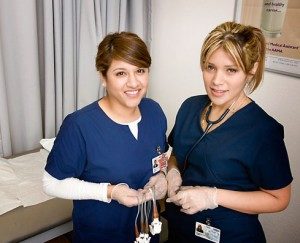
The practice of Phlebotomy is the operation of collecting blood from a patient for the purpose of testing or diagnosis. Many medical professionals employ this skill in fields such as doctors, medical assistants, paramedics and also clinical scientists. To be able to practice this profession, correct certification is required by law in only two US states. However, this is definitely an advantage to anyone looking to practice this type of medical work.
The role exists mainly to relieve doctors and nurses heavy workload by having an expert focusing solely on this aspect of the patient’s diagnosis. Training institutions and community colleges hire phlebotomy instructors to teach the phlebotomy curriculum in a classroom or laboratory setting.
Under the assistance and guidance of phlebotomy instructors, the phlebotomy students are required to complete both the two semesters. In the first semester, the subject matter regards that of human anatomy, HIPPA Laws, physiology, medical technology, laboratory safety precautions and theoretical concepts of phlebotomy. In the second semester, phlebotomy instructors are expected to teach and demonstrate the different procedures regarding blood collection, to the students.
Phlebotomy Instructors
Phlebotomy instructors have a Master’s Degree in Health Sciences, Bachelor of Science in Medical Technology, more than a year of practice in clinical laboratory science, hold a LPN or RN registration, CPT-1 License, extensive clinical experience in Medical Technology and 1 year of teaching experience; these are the key factors needed to be an effective phlebotomy instructor.
In fact, they need to inform their phlebotomy students about the accurate details of HIPPA laws since the confidentiality, protections and privacy of the patients are often at stake.
Instructing teachers have strong presentation skills and good written communication ability mainly due to them needed to portray information to the students in the best possible way for their learning to be of a high standard. For example, in human anatomy and physiology, they need to ensure that their students are well educated on body systems (lymphatic, muscular, circulatory, cardiovascular, nervous, respiratory and skeletal systems) and how they work.
Likewise, they must be adept in research which is essential in phlebotomy as new technologies and understanding can be achieved this way.
Computer proficiency in MS Word, PowerPoint, and Excel are vital since most of the time, they are creating their own resources, handouts and activities for their students.
Further, being patience, diplomatic, sensitive and understanding is necessary as the characteristics of phlebotomy instructors are not only one of a professional practitioner but also a mentor. For instance, some phlebotomy students may not be the same in their learning styles, abilities and disabilities, cultural and ethnic backgrounds and this would require understanding and a varied teaching style in order to get the subject matter across proficiently.
Instructors play an important role not only in planning and organizing the facilities and resources for their students moreover make their teaching is effective. Sometimes, the thoughts and manner of teachers could have an extended influence on students whether it is positive or negative. That’s why the instructors need to be careful in their teaching styles.
The better understanding of the real life situations such as a fear of needles or being likely to faint at the first sight of blood helps the students to realize that they must communicate effectively to the patient or donor before going on. The caring attitudes of phlebotomy instructors will increase the possibility that their students will also have concern for the safety of their patients.
Remember, the first requirement of any hospital before hiring phlebotomists is to ensure that they are properly trained and have passed the certification process. Certification gives assurance to the hospitals that the phlebotomists are well trained and effective at their role.
 A phlebotomist’s main responsibility is to draw blood samples from patients for the purpose of medical testing. A phlebotomy technician is the actually person withdrawing the blood. This position has several advantages over other health-related and nursing careers. Here are the top 5 reasons to become a certified phlebotomy technician.
A phlebotomist’s main responsibility is to draw blood samples from patients for the purpose of medical testing. A phlebotomy technician is the actually person withdrawing the blood. This position has several advantages over other health-related and nursing careers. Here are the top 5 reasons to become a certified phlebotomy technician. Online phlebotomy certification is the answer for busybodies who want to start a career as phlebotomists but are too busy to go to traditional school.
Online phlebotomy certification is the answer for busybodies who want to start a career as phlebotomists but are too busy to go to traditional school. With a great requirement for phlebotomists and training for phlebotomy being relatively short, there is a high demand for careers in phlebotomy. Phlebotomy is a vital part of today’s extremely modern and vast medical field. In a medical team, phlebotomist is important as a doctor. To become a phlebotomy, you have to pass phlebotomy certification exam. Basically, phlebotomists are specialized member of medical unit, whose focus in the section of collection and preservation of blood specimens for diagnostic uses. They sanitize all the required equipments like syringe before used to collect blood and safely dispose all the items after the entire procedure.
With a great requirement for phlebotomists and training for phlebotomy being relatively short, there is a high demand for careers in phlebotomy. Phlebotomy is a vital part of today’s extremely modern and vast medical field. In a medical team, phlebotomist is important as a doctor. To become a phlebotomy, you have to pass phlebotomy certification exam. Basically, phlebotomists are specialized member of medical unit, whose focus in the section of collection and preservation of blood specimens for diagnostic uses. They sanitize all the required equipments like syringe before used to collect blood and safely dispose all the items after the entire procedure. In order to obtain your Phlebotomy certification which then results in the candidate being issued with their Phlebotomy License, an examination has to be written and passed. Whoever conducts this examination, the state you live in or the US government, it is proof that a qualified Phlebotomist will be allowed to practice as a certified Phlebotomist. Not all US states insist in this certification, but in California – they are very strict – no license, no practice, no work.
In order to obtain your Phlebotomy certification which then results in the candidate being issued with their Phlebotomy License, an examination has to be written and passed. Whoever conducts this examination, the state you live in or the US government, it is proof that a qualified Phlebotomist will be allowed to practice as a certified Phlebotomist. Not all US states insist in this certification, but in California – they are very strict – no license, no practice, no work. Phlebotomy is one of the many branches of medicine in which people who will want to specialize in will learn everything about drawing blood samples from patients. Following this procedure, the samples will be analyzed in a laboratory and a diagnosis will be given to the patients of an ailment or a disease. Those who work in this branch and have extensive experience in this procedure are called phlebotomists, medical assistants or phlebotomy technicians.
Phlebotomy is one of the many branches of medicine in which people who will want to specialize in will learn everything about drawing blood samples from patients. Following this procedure, the samples will be analyzed in a laboratory and a diagnosis will be given to the patients of an ailment or a disease. Those who work in this branch and have extensive experience in this procedure are called phlebotomists, medical assistants or phlebotomy technicians. Phlebotomy Technician
Phlebotomy Technician